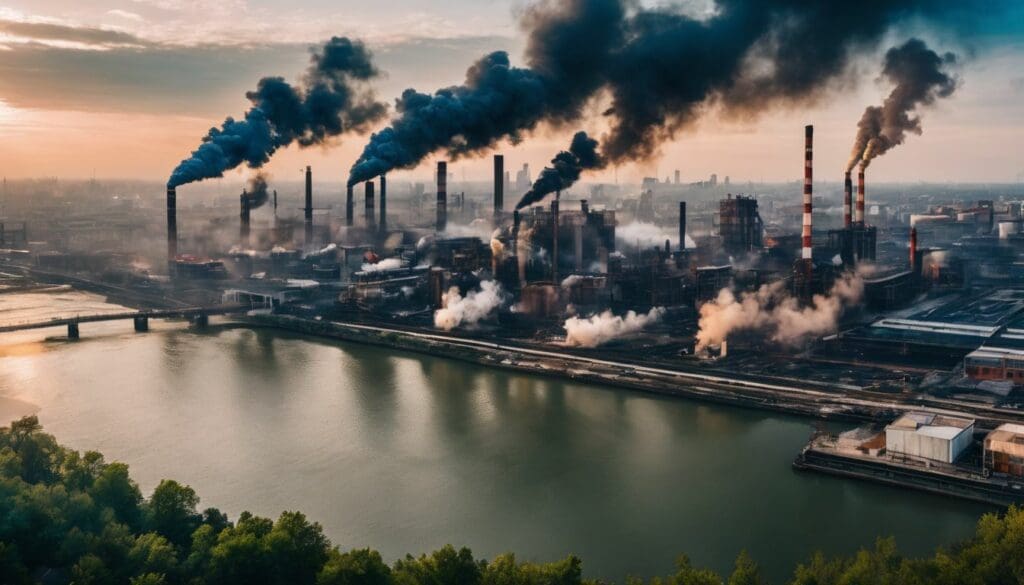Climate change is touching every corner of our planet, leaving many of us worried about the future. It’s a stark reality that human behaviour has significantly accelerated global warming.
This blog post will delve into the ways we contribute to this issue and what actions can be taken to turn the tide. Stay informed; your earth needs you.
Key Takeaways
- Human actions, like burning fossil fuels for energy and transport and cutting down forests, are raising levels of heat-trapping greenhouse gases in the atmosphere.
- This increase in greenhouse gases causes global temperatures to rise, leading to extreme weather events, melting ice caps, rising sea levels, and changes in ecosystems.
- There is a strong scientific consensus that human activities are the primary cause of recent global warming, with evidence such as the unique carbon signature from fossil fuels confirming this.
- We can help tackle climate change by reducing emissions through using less energy at home and work, investing in renewable sources like solar power or wind turbines, and supporting policies aimed at minimising carbon pollution.
- Each person can contribute to fighting global warming by making more sustainable choices such as walking or cycling instead of driving when possible and advocating for eco-friendly community initiatives.
Causes of Global Warming
Greenhouse gases, such as carbon dioxide and methane, trap heat in the Earth’s atmosphere. Human activities, including burning fossil fuels and deforestation, contribute to increased emissions of these heat-trapping gases.
Greenhouse gases
Greenhouse gases trap heat in Earth’s atmosphere, acting like the glass walls of a greenhouse. Carbon dioxide, methane, nitrous oxide, and chlorofluorocarbons (CFCs) are among the most potent of these gases.
They accumulate through various actions such as burning fossil fuels for electricity and transport, deforestation for agriculture or urban sprawl, and industrial processes. Each gas has a different ability to absorb heat; for example, methane is over 20 times more effective at trapping heat compared to carbon dioxide over a 100-year period.
Human activities have significantly increased concentrations of these heattrapping gases since the Industrial Revolution. This rise results predominantly from our reliance on coal, oil, and natural gas which release large amounts of carbon into the atmosphere when burnt.
By cutting down vast areas of forests that previously absorbed carbon dioxide too adds to higher levels circulating in the air. These human-induced emissions upset Earth’s natural balance by enhancing its atmospheric blanket – crafting an environment ripe for climate change with warmer temperatures globally being one stark result.
Human activity
Human activity significantly contributes to global warming. The combustion of fossil fuels, deforestation, and industrial processes release large amounts of carbon dioxide and other greenhouse gases into the atmosphere.
These emissions trap heat from the sun, leading to a rise in global temperatures. In addition, activities such as transportation and agriculture release methane and nitrous oxide, further exacerbating the greenhouse effect.
The burning of fossil fuels for energy production is one of the primary causes of increased carbon emissions. Additionally, agricultural practices like livestock farming also contribute to rising methane levels in the atmosphere.
Increased emissions
Human activities have led to a significant increase in emissions of greenhouse gases such as carbon dioxide, methane, and nitrous oxide. These emissions are mainly from the combustion of fossil fuels for energy and transportation, industrial processes, deforestation, and agricultural practices.
The growing demand for energy has also driven up emissions from power plants and vehicle exhausts.
These increased emissions have substantially amplified the concentration of greenhouse gases in the Earth’s atmosphere, trapping more heat and leading to global warming. This has resulted in adverse impacts on climate patterns and ecosystems worldwide.
Fossil fuel use
To exacerbate the issue of increased emissions, fossil fuel use remains a significant contributor to global warming. The burning of coal, oil, and natural gas releases carbon dioxide and other greenhouse gases into the atmosphere at an unprecedented rate.
These emissions add to the accumulation of heat-trapping gases that are driving climate change.
Furthermore, fossil fuel use is linked to the intensification of extreme weather events and rising sea levels as well as adversely impacting ecosystems across the globe. It is vital for individuals to be aware of their carbon footprint and make conscious efforts to reduce reliance on fossil fuels in order to combat human-induced climate change.
Evidence of Human Contribution
Rising carbon dioxide levels, unprecedented warming, and fossil fuel fingerprinting all point to the undeniable impact of human activities on global warming. To learn more about how human actions are influencing climate change, continue reading this blog post.
Rising carbon dioxide levels
Carbon dioxide levels are increasing due to human activities. Fossil fuel combustion, deforestation, and industrial processes release CO2 into the atmosphere. This traps heat and contributes to global warming.
These rising carbon dioxide levels are a significant driver of climate change, impacting weather patterns, ecosystems, and sea levels.
The burning of fossil fuels like coal, oil, and natural gas is the primary source of increased carbon dioxide in the atmosphere. As such, transitioning to renewable energy sources and prioritising sustainable living practices can help mitigate this issue.
Unprecedented warming
With rising carbon dioxide levels come unprecedented warming, as the Earth experiences temperatures never seen before. Human activities have significantly contributed to this phenomenon, leading to adverse effects on global climate patterns and ecosystems.
As environmentally conscious individuals supporting conservation and environmental sustainability, it’s essential to understand the gravity of this unprecedented warming and take action towards mitigating human contributions to global warming by advocating for sustainable practices and policies.
The unprecedented warming caused by rising carbon dioxide levels demands urgent attention from all sectors of society. Understanding its impact and working collectively towards mitigating human contribution is crucial in preserving our planet for future generations.
Fossil fuel fingerprinting
Scientists can trace the increase in carbon dioxide levels to the burning of fossil fuels. This unique “fossil fuel fingerprint” sets it apart from other sources, such as natural processes or volcanic eruptions.
By analysing isotopic ratios and chemicals present in the atmosphere, researchers can identify human activities as the primary cause of rising greenhouse gas levels. These findings further confirm the significant impact of human actions on global warming.
Understanding this fingerprint is crucial for establishing accountability and driving informed decision-making regarding emissions reductions and policy changes. It provides concrete evidence linking fossil fuel combustion to climate change, reinforcing the urgency for transitioning towards sustainable energy sources.
Natural factors
Natural factors such as volcanic eruptions and solar radiation play a role in Earth’s climate. Volcanic eruptions release sulfur dioxide, which forms aerosols that can temporarily cool the planet by reflecting sunlight.
Solar radiation also fluctuates over time, influencing temperatures on Earth. While these natural factors have historically impacted the climate, human activities are now the dominant force driving global warming.
It is imperative to acknowledge the influence of natural factors on global warming while understanding that human activities significantly exacerbate this issue. By recognising the interplay between natural and anthropogenic influences, we can better address the urgency of mitigating our impact on the environment.
Impact of Human Activities on Climate Change
Human activities, such as burning fossil fuels and deforestation, have significantly contributed to more frequent and severe extreme weather events. Additionally, the rising sea levels and changes in ecosystems also show the impact of human activities on climate change.
More extreme weather events
Extreme weather events, such as hurricanes, heatwaves, and heavy rainfall, are occurring more frequently due to climate change. These events can lead to devastating consequences for both human communities and the environment.
They pose a threat to infrastructure, agriculture, and public health. Additionally, extreme weather can exacerbate existing social inequalities and disproportionately affect vulnerable populations.
Rising global temperatures contribute to the intensity of these events by increasing evaporation rates and altering atmospheric circulation patterns. The resulting changes in precipitation patterns then lead to more frequent and severe droughts or floods in different parts of the world.
Rising sea levels
Rising sea levels are a direct consequence of global warming. The melting of polar ice caps and glaciers, along with the thermal expansion of seawater due to increased temperatures, contribute to this phenomenon.
Coastal areas face the risk of inundation, and low-lying islands may disappear entirely. The impact on ecosystems and human settlements is profound, necessitating proactive measures to adapt and mitigate these changes.
Human activity has significantly accelerated the rise in sea levels by releasing greenhouse gases into the atmosphere. This underscores the urgent need for collective action to address climate change and prevent further escalation of this critical environmental concern.
Changes in ecosystems
With rising sea levels threatening coastal habitats and disrupting ecosystems, the delicate balance of marine life is at risk. Coral reefs, mangroves, and wetlands face degradation as their environments are altered by warmer water temperatures and increased acidity.
These changes not only jeopardise the survival of countless plant and animal species but also affect the livelihoods of communities dependent on these ecosystems for food and resources.
As human activities continue to alter the natural world, proactive measures must be taken to mitigate these impacts on ecosystems. Efforts such as reducing carbon emissions, protecting vulnerable habitats, and promoting sustainable resource management are critical in preserving biodiversity and ensuring the resilience of our planet’s diverse ecological systems.
The Scientific Consensus
The overwhelming evidence and agreement among experts point to human activities as the primary cause of global warming. Read on to learn how we can take action to mitigate our impact on the environment.
Overwhelming evidence
The overwhelming evidence points to human activities as the primary cause of global warming. Scientists have observed rising carbon dioxide levels in the atmosphere, directly linked to human activities such as burning fossil fuels and deforestation.
Additionally, researchers have identified a unique “fingerprint” of fossil fuel emissions on the climate system. This evidence leaves little doubt that human actions are significantly contributing to the unprecedented changes in our planet’s climate.
Moreover, there is widespread agreement among climate experts about the impact of human activities on global warming. The scientific consensus underscores the urgency for collective action to reduce greenhouse gas emissions and address this pressing environmental issue.
Agreement among experts
Experts overwhelmingly agree that human activities are driving global warming. Studies and research have shown a consensus among scientists regarding the impact of greenhouse gas emissions on our climate.
This agreement provides a strong foundation for understanding the urgent need to address human contribution to global warming.
Moving forward, it’s crucial to explore practical solutions towards mitigating this critical issue while also addressing its broader implications for our planet’s future.
Fossil fuel industry’s role in spreading misinformation
The fossil fuel industry has played a significant role in spreading misinformation about the impact of human activities on global warming. This has been achieved through funding and promoting research that casts doubt on scientific consensus, influencing public opinion and policies.
By contributing to the spread of inaccurate information, this industry has delayed crucial actions needed to mitigate climate change.
Misinformation campaigns by the fossil fuel industry have led to confusion among the public and policymakers about the severity of human-induced climate change. These campaigns often downplay the link between fossil fuel use and global warming, creating an obstacle for effective solutions to address the issue.
What Can Be Done to Mitigate Human Contribution to Global Warming?
Mitigating human contribution to global warming involves reducing emissions, investing in renewable energy, implementing policies to limit greenhouse gases, and taking action as individuals.
These actions are crucial in combating the effects of climate change on our planet.
Reducing emissions
Human activities contribute greatly to global warming through the release of greenhouse gases. Reducing emissions from transportation, industries, and energy production is essential in combating climate change.
This can be achieved by transitioning to renewable energy sources, improving fuel efficiency, and implementing policies aimed at cutting down on carbon emissions.
Investing in renewable energy offers a sustainable solution for reducing emissions and curbing the impacts of global warming. Implementing policies that limit greenhouse gas emissions will further aid in mitigating human contribution to climate change.
Taking individual action such as using public transport or carpooling also plays a role in reducing overall emissions impacting our planet’s climate.
Investing in renewable energy
Investing in renewable energy is crucial for reducing our reliance on fossil fuels and mitigating climate change. By channelling resources into solar, wind, and hydroelectric power, we can decrease greenhouse gas emissions while creating a more sustainable future.
Renewable energy initiatives also drive job creation and economic growth, making them a win-win solution for the environment and society as a whole.
Transitioning to renewable energy sources requires collective effort from governments, businesses, and individuals alike. Embracing renewable technologies not only reduces our environmental impact but also fosters innovation and resilience in the face of climate change challenges.
Implementing policies to limit greenhouse gases
Governments worldwide must enforce strict policies to limit greenhouse gas emissions. This includes imposing regulations on industries and setting targets for reducing carbon dioxide and other harmful pollutants.
It also involves promoting cleaner transportation options, such as electric vehicles, and investing in renewable energy sources like solar and wind power. Furthermore, international cooperation is crucial to address global climate issues effectively.
Encouragingly, many countries are already taking steps towards implementing such policies. However, it will require continued effort from all stakeholders to achieve meaningful progress in combating climate change.
Moving forward, individuals can play their part by advocating for sustainable practices and supporting policymakers who prioritise environmental protection.
Taking action as individuals
Individuals can make a significant impact on mitigating global warming. We can reduce our carbon footprint by using energy-efficient appliances, driving less or carpooling, and supporting renewable energy initiatives.
Planting trees, conserving water, and advocating for sustainable practices in our communities are also effective ways to combat climate change.
By making small changes in our daily lives and encouraging others to do the same, we can collectively contribute to reducing greenhouse gas emissions and protecting the environment for future generations.
Conclusion
In conclusion, human activities significantly contribute to global warming by increasing greenhouse gas emissions. We need to take action now and reduce our reliance on fossil fuels.
Investing in renewable energy and implementing policies to limit emissions are crucial steps towards mitigating climate change. The responsibility falls on all of us to make a positive impact on the planet’s future.
FAQs
1. What is the human contribution to global warming?
The human contribution to global warming includes releasing gases like chlorofluorocarbons (CFCs) into the atmosphere, which trap heat and raise Earth’s temperature.
2. Are natural variability and human activities both responsible for global warming?
Yes, although natural variability plays a role in climate change, scientific evidence shows that human activities are currently the main factor driving global warming.
3. How do chlorofluorocarbons (CFCs) affect global warming?
CFCs, once commonly used in aerosols and refrigerants, damage the ozone layer and contribute significantly to trapping heat in our atmosphere, thus contributing to global warming.
4. Can we reverse the effects of CFCs on global warming?
By phasing out CFC use and adopting more eco-friendly practices, we can limit their impact on the environment, but it takes time for their concentration in the atmosphere to decrease.





